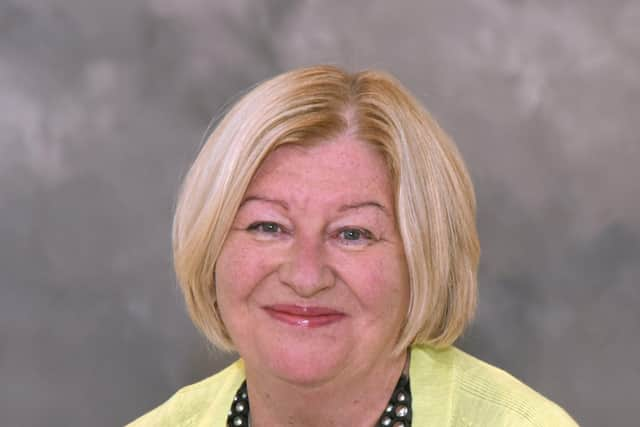Falkirk councillor wants to end stigma after Covid left her needing hearing aids
and live on Freeview channel 276
Councillor Lorna Binnie, who represents Falkirk South, says she felt completely isolated when she first noticed that she was struggling to hear properly.
The SNP politician’s hearing loss began after a spell of ill health that started last summer when she caught Covid-19. It was followed by pneumonia and then another virus, which left her finding it hard to breathe. Since then she has been left with upper respiratory problems and a very noticeable loss of hearing.
Advertisement
Hide AdAdvertisement
Hide Ad“It wasn’t a nice feeling when i realised I couldn’t hear. I felt clumsy and I felt cut off,” she said. “I’m usually a very positive person but for the first time in my life, I felt down. I felt socially isolated.”


Describing when her young grandson came to visit and she couldn’t hear him, she said: “that broke my heart.” “I should have gone to the doctor earlier,” she admits.
When she did eventually ask for help, she was told that there would be an 18-week wait for an NHS hearing test although in fact a cancellation came up much earlier. She said: “I got a hearing test very quickly and two new hearing aids within a fortnight.”
But the experience made her very aware that being unable to hear properly is all too often dismissed or laughed at – leading to many people unwilling to wear their hearing aids in public.
Advertisement
Hide AdAdvertisement
Hide Ad“The stigma is dreadful – I was made to feel stupid because I couldn’t hear people and that is really horrible,” she said. “It really is like an invisible condition. There is a lot of ageism too – people with hearing loss are made fun of.”
Hearing loss among older adults is very common. By the age of 65, one out of every three people has trouble hearing and one in two by the age of 75. But the stigma is so bad that research has shown it takes an average of six years before people eventually go for a hearing test.
Councillor Binnie added: “I think it’s because people don’t understand. I think we have to get rid of the stigma and the way we do that is through education.”
During her diagnosis, she was told that 30 per cent of her hearing loss was caused by getting older and 50 per cent caused by the illness.
Advertisement
Hide AdAdvertisement
Hide AdShe continued: “When I think about it now, even before I was ill, my sons used to complain about how loud my television was. It’s supposed to be about 20 and mine was up at 60. Things like that are a sign that it might be time to get your hearing tested.
“We will go and get new glasses without a second thought and yet hearing is far more stigmatised for some reason. People avoid seeking treatment – perhaps because they think a hearing aid makes them look older and less capable.”
But it is important that people seek help as quickly as possible. There is good evidence that when hearing loss is left untreated, it can also have serious impact on both physical and mental health.
“I think hearing loss is more prevalent than we realise but many people accept it and just think ‘I’m getting old’,” she added.
Advertisement
Hide AdAdvertisement
Hide AdThe grandmother is still waiting for an appointment to see an ear, nose and throat (ENT) consultant to find out if her hearing loss is permanent and perhaps pinpoint exactly what caused it. But the two discreet hearing aids she now wears means she can get on with her life again.
As a councillor, she is often in meetings and taking phone calls as well as talking to people face to face. She was incredibly relieved to find that her digital hearing aids, from the NHS, allow her to take part in meetings, online and in-person, and use the phone easily.
“It’s changed my life – I say it’s like putting my ears on now,” she said.
She is very grateful for the support she’s had from the NHS audiology team, including the volunteers in Falkirk Community Hospital, who service hearing aids. “It’s a brilliant service and these volunteers should be commended – they are just so kind,” she said.
Advertisement
Hide AdAdvertisement
Hide AdCouncillor Fiona Collie, who is the spokesperson for health and social care for Falkirk Council, also has personal experience of hearing loss and has used hearing aids for the largest part of her life.
She said: “First of all, I would say to anyone worried about hearing loss not to struggle on alone – there is help out there. As a first step, contact your GP practice to discuss your hearing. They can check your ears and refer you either to NHS Forth Valley’s excellent audiology service for hearing testing and, if needed, hearing aids or to the Ear Nose and Throat Service.
She would also encourage people to visit NHS Forth Valley’s website: nhsforthvalley.com/health-services/az-of-services/audiology-services.
She added: “Another great place to visit for support with hearing loss is Forth Valley Sensory Centre in Camelon. They have lots of groups and classes for people with sensory loss and a lovely café too.”
Advertisement
Hide AdAdvertisement
Hide Ad“Falkirk Council’s Sensory Team is also based there which helps support people with hearing or sight loss who might need help in their day to day lives, including equipment that can help with everyday things like hearing the phone or television and with alerts such as visual doorbells or smoke alarms.
“Finally, Falkirk Health and Social Care Partnership’s Living Well website is well worth a visit. It has lots of information online about support and equipment for people with a hearing loss at livingwellfalkirk.lifecurve.uk.”